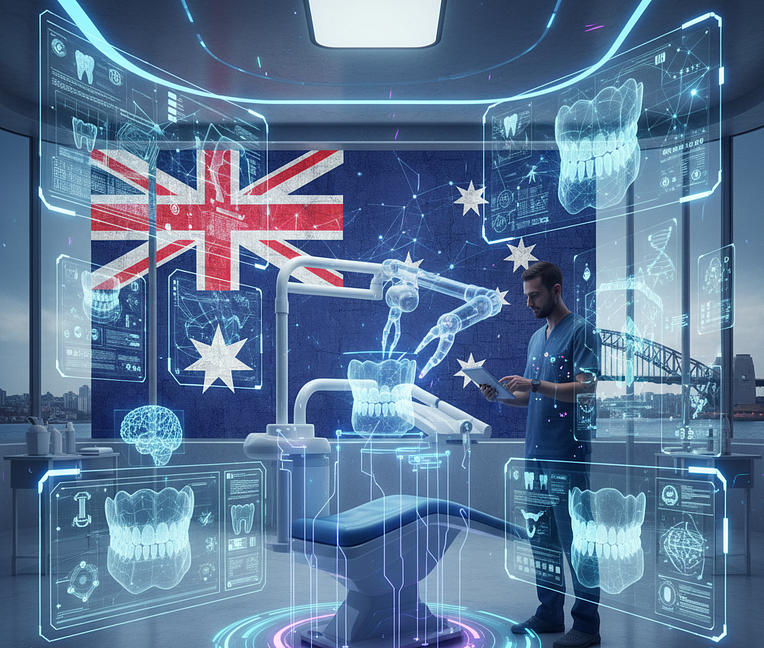AI and the Future of Dentistry in Australia
Crafting the next chapter in Australian oral healthcare
Artificial intelligence is significantly transforming dentistry in Australia, influencing how oral healthcare is delivered, how students learn and how patients access essential services. A recent national review highlights that AI is no longer an emerging concept but an important element woven into the country’s oral health landscape.

The Expanding Role of AI in Clinical Dentistry
AI technologies are significantly improving diagnostic accuracy, treatment planning and clinical decision-making says dentist in Shellharbour. Researchers at the University of Queensland have identified clear evidence that machine learning systems already assist in detecting oral conditions earlier and with greater precision than many traditional methods. These tools are proving valuable across areas such as orthodontics and pathology, where timely identification of issues is essential for effective intervention.
Predictive modelling is another growing advantage. By analysing patterns within patient data, AI can anticipate disease progression and help dental professionals tailor personalised treatment strategies. This level of insight supports more proactive care and enhances the quality of patient outcomes.
AI Enhancing Dental Education and Training
Beyond clinical applications, AI is expanding opportunities within dental education. Students located outside major metropolitan areas often face limited access to training resources, yet virtual learning environments are helping bridge this gap. AI assisted feedback systems allow learners to practice skills, receive accurate guidance and improve performance without the need for continuous physical supervision.
These innovations contribute to more equitable access to professional development, ensuring future dental practitioners receive consistent training regardless of location. As technology evolves, the potential for AI to refine and enhance dental education will continue to grow.
Improving Patient Access and Experience
AI is also expanding access to care for patients in rural and remote regions. Wearable devices and teledentistry platforms supported by smart algorithms allow individuals to receive timely assessments and ongoing monitoring without travelling long distances. This improved connectivity helps address long standing gaps in oral health services across Australia.
The rising use of AI powered mobile applications offers additional support for maintaining daily oral hygiene, spotting early warning signs and encouraging preventive care. These tools empower patients to take a more active role in managing their oral health.
Ethical and Regulatory Responsibilities
While AI offers significant benefits, the review emphasises that its integration requires careful attention to ethical and regulatory considerations. Algorithmic bias poses a risk where training datasets do not reflect the diversity of Australia’s population. If left unchecked, this can reinforce existing inequities in oral healthcare.
Data privacy is another major priority as digital systems increasingly handle sensitive patient information. Robust governance frameworks are essential to protect confidentiality and maintain trust. Additionally, practitioners must avoid over reliance on automated outputs. AI should support clinical judgement rather than replace it, ensuring that human expertise remains central to patient care.
Know more about Digital Dentistry vs. Traditional Dentistry: What’s the Difference?
Commitment to High Quality Dental Care
At Shell Cove Dental, the Shellharbour dental specialists team is dedicated to providing healthy and attractive smiles through a wide range of services including dental implants, general dentistry, digital smile design and cosmetic dentistry. As AI continues to shape the future of oral healthcare, the commitment to delivering trusted and patient centred care remains at the heart of every service offered.
Final Thoughts
AI is transforming the future of dentistry in Australia by improving clinical precision, broadening educational opportunities and expanding access to care. While the technology brings profound benefits, it also requires responsible implementation to address ethical, regulatory and safety considerations. With balanced oversight and a continued focus on patient wellbeing, AI is set to play an increasingly important role in building a stronger, more accessible and more innovative oral healthcare system.
Frequently Asked Questions
How is AI improving dental diagnosis?
AI increases diagnostic accuracy by identifying conditions earlier and interpreting complex data with greater precision.
Can AI benefit dental students in regional areas?
Yes. Virtual simulations and AI guided feedback improve access to
quality training for students outside major metropolitan regions.
Are AI powered tools safe for patient use?
When monitored responsibly and supported by strong data governance, AI tools can enhance safety and improve patient outcomes.
Will AI replace dentists in the future?
No. AI is designed to support dentists, not replace them. Human expertise and clinical judgement remain essential.

Comments
Post a Comment